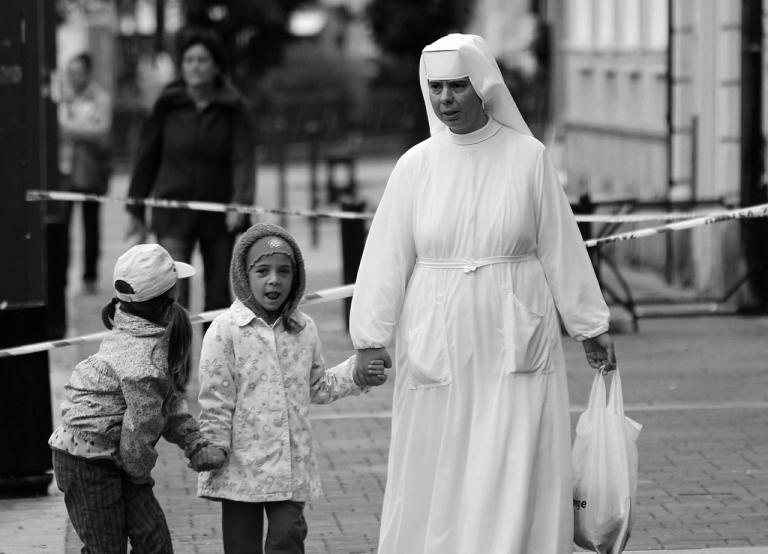I’ve been mostly avoiding writing about the Synod, because I’ve honestly just been too tired, but the most recent controversy is one that I’m actually interested in. It recently came to light that a non-ordained man had been admitted as a voting member of the Synod – a move that I definitely applaud since it’s a small step towards reducing clericalism in Church decision making. The guy is still a celibate with religious vows, so apparently we’re some steps away from allowing people with families to have a real say in how the Church deals with family life. But the more important question, which has been raised, is why a male religious, and no women?
The Church knows that She has a problem with patriarchy. For as long as I’ve been a Catholic, and I believe going back to Vatican II, there’s been a lot of talk in the highest circles – and even in the official documents of the Church – about the need for greater inclusion of women. A lot of words have been spoken. Nice things have been said. Feet have been shuffled. And the bottom line is that half a decade later, we’re still dealing with this problem.
Now, before I have anyone jumping on my head I am not suggesting that we should institute women’s ordination. The Sacraments have a specific form, and they can’t just be changed for the sake of political convenience. But it’s clear that there are ways that the institutional structures of the Church can be changed in order to provide women with actual power, and I think it’s hugely problematic that this isn’t being done.
I would go so far as to say that the failure to meaningfully include female voices is a significant contributing factor to most of the major issues the Church is struggling with today. From the rejection of the teaching on contraception, to the lack of community and fellowship in our parishes, to the crisis of the family, I honestly don’t think that real progress is going to be made without harnessing the incredible and largely untapped resources of what John Paul II called “the feminine genius.”
Simply put, women’s spiritual energy has always been a major factor in the health of the Church. By energy here I don’t mean something New Agey: I mean the very practical application of women’s effort, determination and care in our spiritual communities. I mean women’s religious orders that provide for the education of children, the care of the sick, and the support of the poor. I mean women’s activity in building the community of the parish. I mean all of the prayers that get pumped out by the incredible spiritual powerhouse of the old rosary ladies. I mean the regular, day-to-day business of attending to the details of Christian life.
Women have always done that stuff in the Church, just as they’ve always done it in the domestic sphere and in the world. Women’s emotional and spiritual labour has always provided the necessary foundation on which spiritual communities are built.
This is crisis for the Church today because, with the advent of feminism, women have learned that they have this power – and we’ve learned to use it to say “No.” We’ve learned that we can exercise a veto. And this isn’t a bad thing: it’s actually an opportunity, a call to repentance, and a chance to heal systems of domination and sin that have arisen out of a male-dominated culture.
The fact that the historical exclusion of women is sinful is one that has been recognized, in theory, by Church authorities – most notably, by John Paul II in his letter on the Dignity and Vocation of Women. In Theology of the Body, he provides new ways of understanding the Christian tradition surrounding marriage, understanding it as a Sacrament of “mutual subjugation,” rather than as a codification of the subjugation of women under men. Theologically speaking, the Church has made tremendous progress towards recognizing women’s right to be included and respected as equal to men.
Thing is, words just ain’t enough. The vast majority of women living in today’s culture are still living in the thick of a massive cultural shift – a shift from a male-dominated world in which women are functionally inferior, to one in which equality is a practically realized norm. Women are fighting these battles in every arena of life. We are struggling to be heard on equal terms in the boardroom, struggling to create systems that don’t economically penalize our bodies and our fertility, struggling to get our husbands to change their share of diapers and wash their share of dishes.
We’re all pretty thoroughly aware that men do not make these changes easily, or, for the most part, willingly. We know about lip service. And we know that in a lot of cases the only way to bring about change is to make it absolutely clear that we will not put up with the status quo.
I think that the bottom line is, this is what is happening in our churches. Women are refusing to work without representation. As a group, women have said “No.” No, we will not organize the parish dinner, and run the parish lottery, and host the parish ladies’ night, and staff the children’s liturgy, and pop out the next generation of good Catholics, and pray, pray, pray for vocations and for the needs of the Church unless, until, we actually get a say.
And we can see the effect of this. Many of our Catholic communities are functionally ghost towns, where a few elderly parishioners soldier on in hope of better days. Everyone talks of parish level renewal, but nobody seems to be able to come up with a coherent strategy for bringing it about. Catholic marriage is in crisis, and increasingly our children are growing up to leave the faith.
Why? Because the traditional work of women isn’t being done. And it isn’t being done, not because the women are lazy, or faithless, or ungrateful, but because we are overwhelmingly tired of being expected to work without a voice. We’ve stopped putting up with being silent, obedient partners in our marriages, and with being second-rate citizens in the political sphere – so why would we continue to put up with it in the Church?
We know systems of power will always seek to maintain the status quo for as long as possible (even if they involve individually good people who are individually sympathetic to the cause of the oppressed.) And we know that the most effective non-violent solution to this problem is refusal to submit. The conscientious withholding of work has always been a morally appropriate response to continuing injustice – and I think it’s tacitly the response that Catholic women have adopted to the hierarchy’s foot-dragging about real inclusion for women in the power-structures of the Church.
With the inclusion of a layman in the voting membership of the Synod the Church demonstrated that it is possible to include non-clergy in decision-making processes. That means, women could have been included – and more importantly, that they can be included in the future. It’s time for the Church to stop talking about it and actually do this, because the problems that are facing Her cannot be solved by men alone.
Photo courtesy of Pixabay













